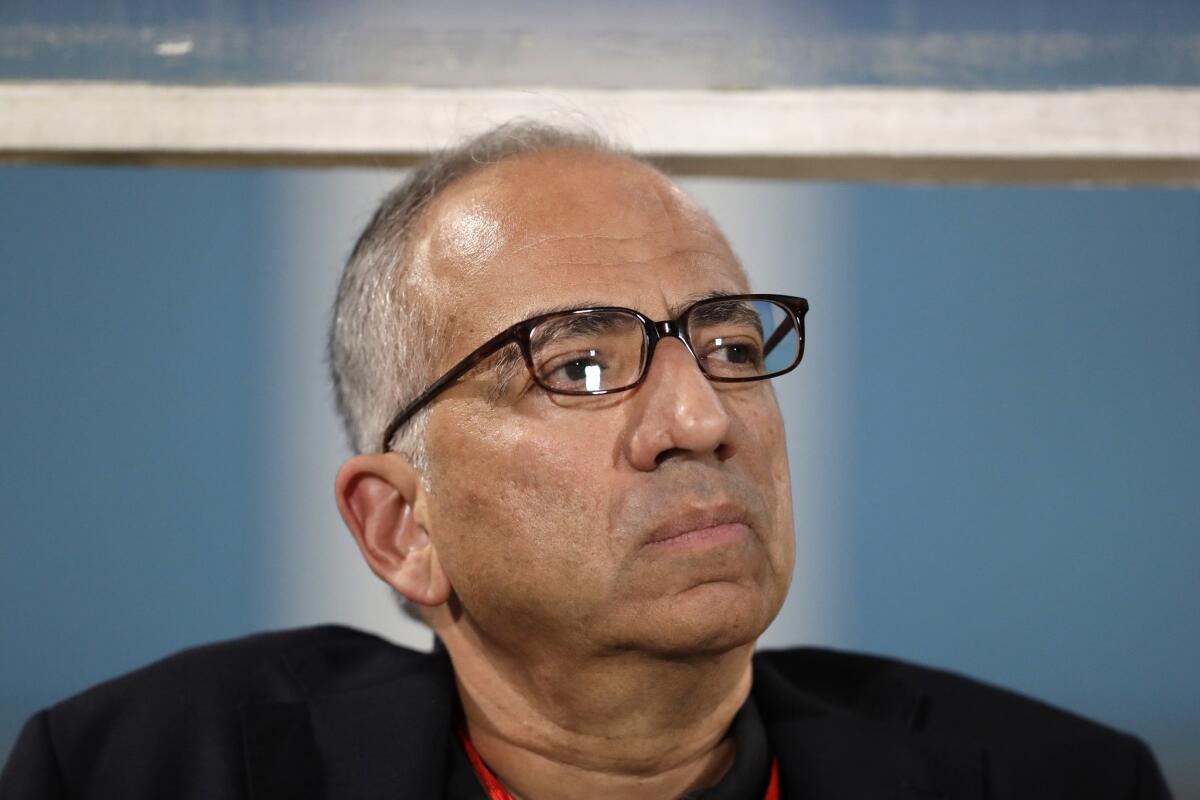Column: New U.S. Soccer president starts job with a long to-do list

- Share via
So now that Carlos Cordeiro has been elected president of the U.S. Soccer Federation, what’s next?
In the short term, probably not much. Cordeiro, a former Goldman Sachs executive, has promised to run the sport much like a CEO runs a major corporation. So, for the time being, expect a lot of committees being formed and a lot of studies being undertaken.
“My campaign was all about being more collaborative,” Cordeiro said. “I’ve long felt we had a great board. But that board has to be engaged. We’ve already put some committees in place. We’re going to add committees to what we have.
“By doing that, people get more involved and I think you’ll see a very different leadership going forward.”
That, ultimately, may prove to be the best approach. Because while the stunning failure of the U.S. national team to qualify for this summer’s World Cup set in motion the events that led to Cordeiro’s election, the structural problems underpinning that failure have been festering for years.
U.S. Soccer needs a new approach to youth development at the grassroots level and a solution to the pay-to-play barriers that have locked out kids from low-income homes. The relationships with state associations — the foundation of the sport — have to be repaired. Gender equity and the inclusion of immigrant communities must be addressed.
Cordeiro says he understands all that and wants to fix it. Yet that’s just the short list and accomplishing all of it could take years, making a deliberate, contemplative and coordinated campaign smart.
But there are pressing issues as well, chief among them the joint U.S.-Canadian-Mexican offer to stage the 2026 World Cup, which the new president calls the most important priority for the federation. The final paperwork for that bid, which is being steered by Sunil Gulati, the man Cordeiro replaced as president, must be filed with FIFA, the governing body for international soccer, next month.
After that, Cordeiro and Gulati will begin an intense global campaign to lobby support for the plan. Morocco is the only other nation interested in hosting the 2026 tournament. A vote to determine the winning site will be held in June.
Cordeiro must also begin soon the process of creating, then filling, technical director positions for the men’s and women’s national teams, after which he will have to select a replacement for Bruce Arena, who resigned as coach of the men’s team after the qualifying failure last October.
Then there are the lawsuits, two of which were filed against the USSF board during the election campaign.
That’s a pretty big to-do list for a president who is basically an unpaid volunteer — albeit one running a $110-million business with 170 full-time employees and more than 4.4 million registered members. And some of the problems Cordeiro will be tackling are ones he may have had a hand in creating, since he was U.S. Soccer’s vice president the last two years and has been part of the federation’s leadership since 2007.
But he has bigger plans. Although the USSF more than doubled its budget in 12 years under Gulati, Cordeiro wants to quadruple it, to $500 million, pulling the U.S. even with or ahead of world powers England, Spain, France and Italy.
“Why are we focused on the World Cup? Because the World Cup is going to generate hundreds of millions of dollars to us,” he said a couple of hours after last week’s USSF election, held in a massive ballroom near the entrance to the Sea World amusement park in Orlando, Fla. “For us to seriously challenge these countries day in and day out, we need more resources. Those resources will go largely to the grass roots.”
Many are willing to give him a chance to make that happen.
“I was impressed with his ideas, his vision for the governance within U.S. Soccer,” said Stuart Holden, a World Cup veteran and a member of the Athletes Council, which voted as a bloc for Cordeiro, tilting the election in his favor. “I also loved that he was vulnerable in saying he is not the smartest soccer guy in the room and he wants to find the smartest soccer guys. That resonated strongly.”
Cordeiro, who is of Colombian, Portuguese and Indian descent, came to the U.S. at 15 but did not play organized soccer beyond his high school days in Miami. Instead he went on to earn a scholarship to Harvard before embarking on a career in finance that saw him work for leading banks in New York and London before joining Goldman Sachs, where he became a partner and managing director.
It’s an immigrant success story writ large. And it’s that immigrant experience, in addition to the financial experience, that will inform his work as USSF president — and may ultimately determine his success as well.
“For us to grow the sport into a preeminent position, we have to be more inclusive. We have to reach out to those underserved, more diverse immigrant populations,” he said after his election. “We have to reach and get them and bring them in.
“To the extent we can be successful in doing that, we’re going have a lot better players over time. The challenges are making soccer more affordable.”
Follow Kevin Baxter on Twitter @kbaxter11
More to Read
Go beyond the scoreboard
Get the latest on L.A.'s teams in the daily Sports Report newsletter.
You may occasionally receive promotional content from the Los Angeles Times.







